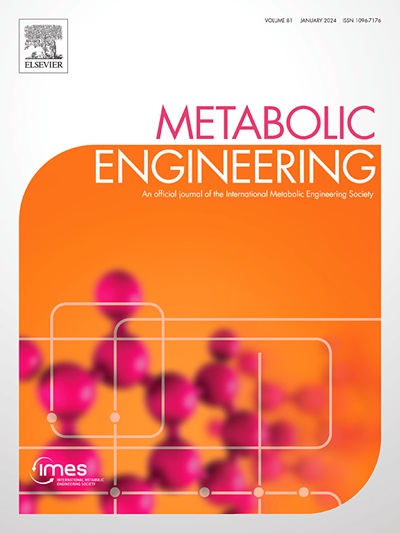Reusable and modular combinatorial libraries for iterative metabolic engineering of Saccharomyces cerevisiae
IF 6.8
1区 生物学
Q1 BIOTECHNOLOGY & APPLIED MICROBIOLOGY
引用次数: 0
Abstract
Efficiently rewiring microbial metabolism for molecule production lies at the core of industrial metabolic engineering. Combinatorial libraries are useful for directing metabolism towards molecule production; however, their construction is labor-intensive, and their use in iterative strain engineering campaigns is often restricted by site-specific genomic integration. Here we present an automation-friendly framework for generating reusable and modular integration-based combinatorial libraries that can be used repeatedly to build high-performing strains. We apply this approach to engineer the production of betacyanins, a commonly used red food colorant extracted from beetroots, in Saccharomyces cerevisiae. Iterative implementation of combinatorial libraries targeting the betacyanin biosynthesis pathway (design space: ∼25,000), precursors (design space: ∼43,000), and cofactors (design space: ∼26,000) consistently improved pigment production by 1.2–5.7-fold per cycle over seven rounds of engineering. Sequencing of high-performing library isolates from each round revealed unique insights into betacyanin and yeast metabolism, e.g. we found strong evidence implicating the S. cerevisiae cytochrome b5 in heterologous red beet pigment production. Altogether, this study demonstrates a framework for combinatorial library engineering well-suited for accelerating the development of high-performing cell factories for industrial fermentation processes.
用于酿酒酵母迭代代谢工程的可重用和模块化组合库。
有效地重组微生物代谢以生产分子是工业代谢工程的核心。组合文库有助于将代谢导向分子生成;然而,它们的构建是劳动密集型的,并且它们在迭代菌株工程活动中的使用经常受到特定位点基因组整合的限制。在这里,我们提出了一个自动化友好的框架,用于生成可重用的和模块化的基于集成的组合库,可以重复使用来构建高性能的菌株。我们将这种方法应用于酿酒酵母中甜菜青素的工程生产,甜菜青素是一种常用的从甜菜根中提取的红色食品着色剂。针对甜菜花青素生物合成途径(设计空间:~ 25,000)、前体(设计空间:~ 43,000)和辅因子(设计空间:~ 26,000)的组合文库的迭代实施在七轮工程中不断提高色素产量,每个周期提高1.2-5.7倍。对每一轮的高效文库分离物进行测序,揭示了甜菜青素和酵母代谢的独特见解,例如,我们发现了强有力的证据,表明酿酒酵母细胞色素b5参与了异源红甜菜色素的生产。总之,本研究展示了一个组合文库工程框架,非常适合于加速工业发酵过程高性能细胞工厂的开发。
本文章由计算机程序翻译,如有差异,请以英文原文为准。
求助全文
约1分钟内获得全文
求助全文
来源期刊

Metabolic engineering
工程技术-生物工程与应用微生物
CiteScore
15.60
自引率
6.00%
发文量
140
审稿时长
44 days
期刊介绍:
Metabolic Engineering (MBE) is a journal that focuses on publishing original research papers on the directed modulation of metabolic pathways for metabolite overproduction or the enhancement of cellular properties. It welcomes papers that describe the engineering of native pathways and the synthesis of heterologous pathways to convert microorganisms into microbial cell factories. The journal covers experimental, computational, and modeling approaches for understanding metabolic pathways and manipulating them through genetic, media, or environmental means. Effective exploration of metabolic pathways necessitates the use of molecular biology and biochemistry methods, as well as engineering techniques for modeling and data analysis. MBE serves as a platform for interdisciplinary research in fields such as biochemistry, molecular biology, applied microbiology, cellular physiology, cellular nutrition in health and disease, and biochemical engineering. The journal publishes various types of papers, including original research papers and review papers. It is indexed and abstracted in databases such as Scopus, Embase, EMBiology, Current Contents - Life Sciences and Clinical Medicine, Science Citation Index, PubMed/Medline, CAS and Biotechnology Citation Index.
 求助内容:
求助内容: 应助结果提醒方式:
应助结果提醒方式:


